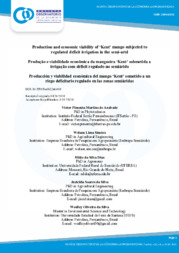Production and economic viability of Kent mango subjected to regulated deficit irrigation in the semi-arid.
Production and economic viability of Kent mango subjected to regulated deficit irrigation in the semi-arid.
Author(s): ANDRADE, V. P. M. de; SIMOES, W. L.; DIAS, N. da S.; SILVA, J. S. da; SILVA, W. O. da; BARBOSA, K. V. F.; MOUCO, M. A. do C.; TORRES JUNIOR, V. G.
Summary: Mango (Mangifera indica L.) production has great importance for Brazilian agriculture, being concentrated in the states of Bahia and Pernambuco. Although mango is a drought-tolerant crop, inadequate irrigation management reduces its yield. Thus, the objective was to evaluate production parameters and economic viability of ‘Kent’ mango subjected to controlled water deficit in the phenological stages of flowering, fruit growth and maturation. The experiment was conducted in the municipality of Petrolina/PE, semi-arid region of the São Francisco Valley, in a ultisol. The experimental design was randomized blocks, in a triple factorial scheme, with application of four irrigation depths (40, 60, 80 and 100% of crop evapotranspiration -ETc), three phenological stages (F1 -flowering, F2 -fruit growth, F3 -fruit maturation) and two production cycles (2018 and 2019 seasons), with four replicates, each of which consisting of four plants. The irrigation with 40% ETc in the flowering stage and 80% of the ETc in the growing and ripening of fruits phases promoted higher yield, water use efficiency and benefit/cost ratio in the cultivation of ‘Kent’ mango in the Brazilian semi-arid region.
Publication year: 2024
Types of publication: Journal article
Unit: Embrapa Semi-arid Region
Observation
Some of Embrapa's publications are published as ePub files. To read them, use or download one of the following free software options to your computer or mobile device. Android: Google Play Books; IOS: iBooks; Windows and Linux: Calibre.
Access other publications
Access the Agricultural Research Database (BDPA) to consult Embrapa's full library collection and records.
Visit Embrapa Bookstore to purchase books and other publications sold by Embrapa.

